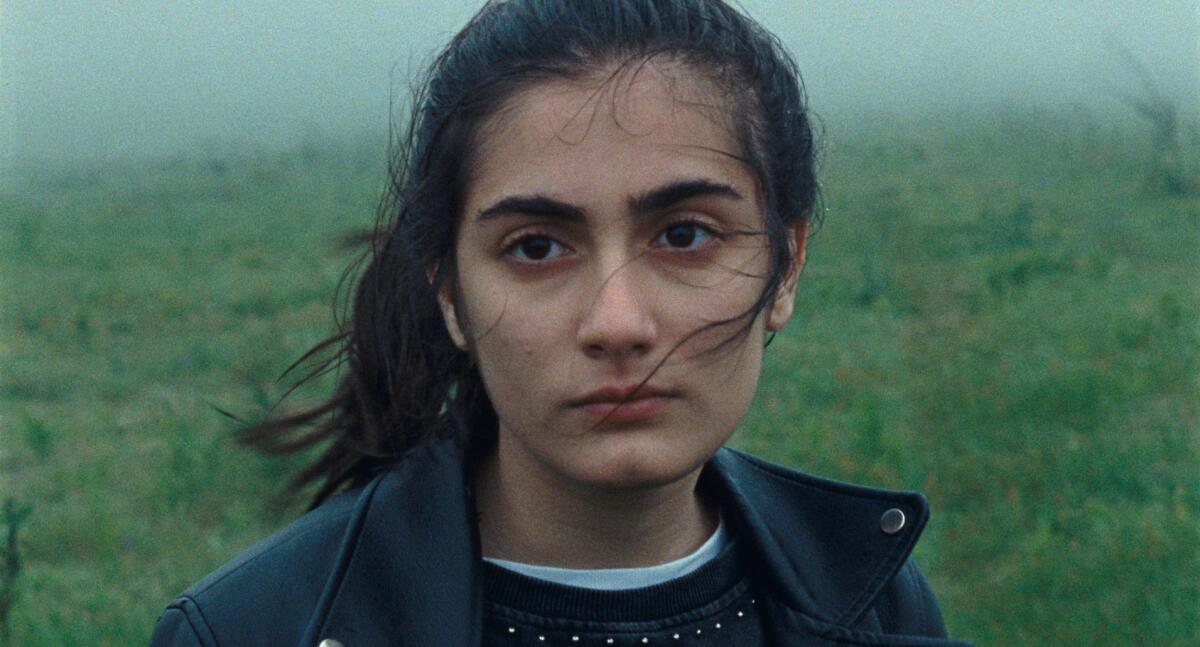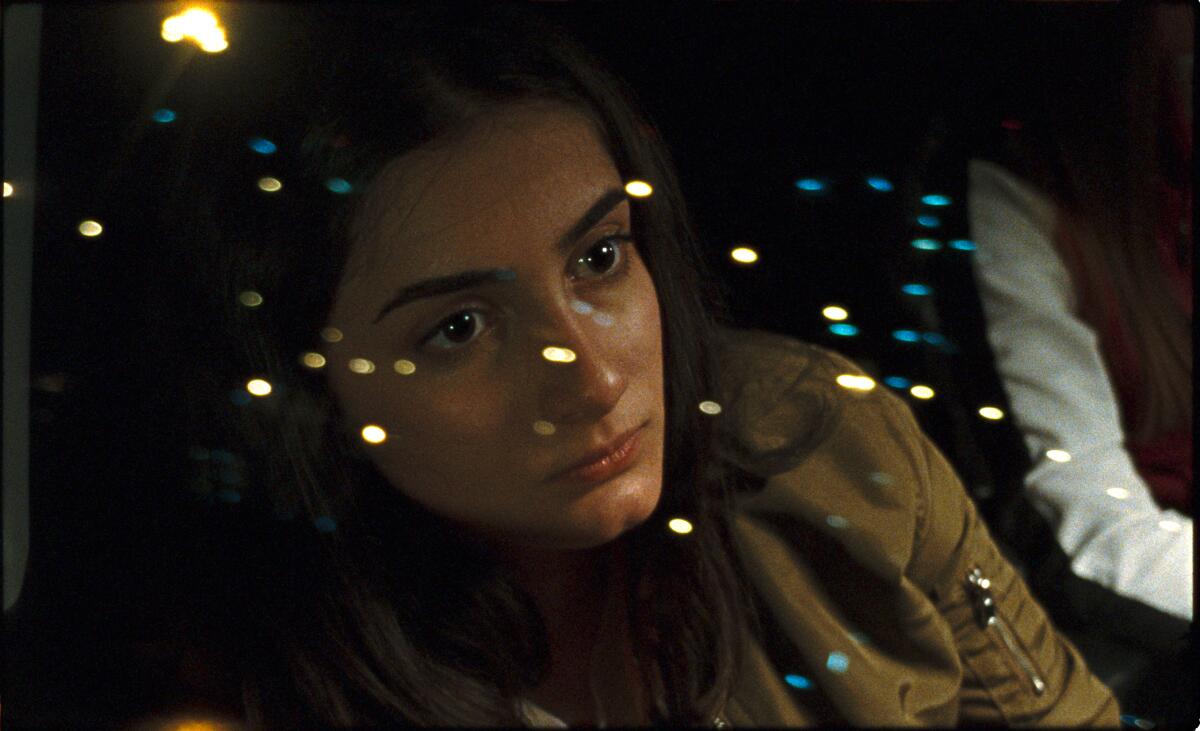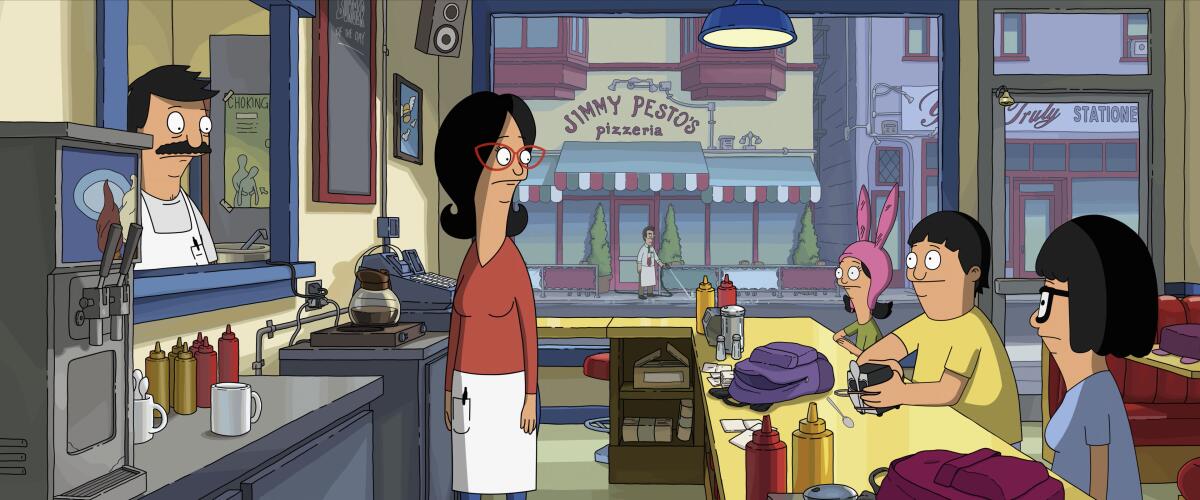A mob princess awakens in ‘A Chiara’

- Share via
Hello! I’m Mark Olsen. Welcome to another edition of your regular field guide to a world of Only Good Movies.
Only good movies
Get the Indie Focus newsletter, Mark Olsen's weekly guide to the world of cinema.
You may occasionally receive promotional content from the Los Angeles Times.
This has been a difficult week, as the shooting at a school in Ulvade left people feeling numb, confused, drained. Matthew McConaughey, who was born in the small Texas town, released a statement that read, “The true call to action now is for every American to take a longer and deeper look in the mirror, and ask ourselves, ‘What is it that we truly value? How do we repair the problem? What small sacrifices can we individually take today, to preserve a healthier and safer nation, state, and neighborhood tomorrow?’ … We all know we can do better. We must do better.”
Ray Liotta is remembered. The actor died this week at the age of 67. He was best known for his role in Martin Scorsese’s “Goodfellas” (1990) as mobster Henry Hill, a single role that showed off the range he was capable of, shifting easily from menace to charm to wounded tenderness. The actor also appeared in a broad spectrum of films including “Something Wild,” “Field of Dreams,” “Corrina, Corrina,” “Unlawful Entry,” “Narc,” “Copland,” “Killing Them Softly,” “Observe and Report” and “Marriage Story.” Much of his work is available on streaming platforms, making them easy to revisit.
Cannes continues. Justin Chang is still in the south of France soaking up the movies of the Cannes Film Festival. This week he took in David Cronenberg’s “Crimes of the Future,” George Miller’s “Three Thousand Years of Longing,” Ruben Östlund’s “Triangle of Sadness” and Baz Luhrmann’s “Elvis.”
I am sure I’ve mentioned my own personal fandom of Elvis Presley here before. If you know me at all, you know he is someone I talk about easily and often, and so I was particularly interested in Justin’s response to Luhrmann adding his high-energy, high-gloss style to the life of the American icon. As Justin wrote, “To complain that ‘Elvis’ is basically a compilation of musical-biopic conventions is a bit like complaining about a greatest-hits album; it also misses one of Luhrmann’s strengths as a filmmaker, which is his ability to suffuse clichés with sincerity, energy and feeling.”
Cronenberg at the Cinematheque. Speaking of David Cronenberg, as his new film will be opening next week, the American Cinematheque is presenting a series called “Crimes of David Cronenberg,” a handy primer of some of his previous films in preparation for his latest. Among the series are “A History of Violence” and “Eastern Promises,” both starring Viggo Mortenson, along with “Existenz,” “Videodrome,” “Dead Ringers,” “The Fly” and Cronenberg’s 1970 film also called “Crimes of the Future,” unrelated to his latest except for the title.
The Cinematheque will also be launching an ambitious new series called “Bleak Week: Cinema of Despair,” which is just as it sounds, a survey that explores the catharsis that comes from cinematic bummers. Among the titles are Robert Bresson’s “Au Hasard Balthazar,” Agnès Varda’s “Vagabond,” Béla Tarr’s “Sátántangó,” Ingmar Bergman’s “Winter Light,” Michael Haneke “Funny Games,” Claire Denis’ “Bastards,” Lars Von Trier’s “Breaking the Waves,” Lynne Ramsay’s “Ratcatcher” and many more. I will be introducing the June 5 screening of Larry Clark’s “Kids.”
The Envelope podcast is back! The podcast returned for a new season this week, with my colleague Yvonne Villarreal talking to Jane Fonda and Lily Tomlin about the final season of their show “Grace and Frankie,” the longest-running show on Netflix. As Fonda said of working with Tomlin, “I mean, you get to know each other pretty darn well because, in a movie, it’s a relatively short period of time. And you can fake it, be a good person. But over seven years, if you’re not really a good person, it shows. And guess what? She’s a good person.”
Enjoying this newsletter? Consider subscribing to the Los Angeles Times
Your support helps us deliver the news that matters most. Become a subscriber.
‘A Chiara’
Written and directed by Jonas Carpignano, “A Chiara” completes an informal trilogy with his previous films “Mediterranea” and “A Ciambra.” In the latest film, which won the Directors’ Fortnight at last year’s Cannes, a 15-year-old girl named Chiara (Swamy Rotolo) grapples with the realization that her life of relative privilege is due to her father’s work as a mobster and drug dealer. The movie is in theaters now in limited release, including the Laemmle NoHo 7, North Hollywood.
For The Times, Robert Abele wrote, “‘A Chiara’ is U.S.-born, Italy-based Carpignano’s third feature. If it’s your first acquaintance with his work, you’re in for a roughly evocative, suspenseful tale in the same compelling vein as the Dardenne brothers’ intimate, propulsive and nonjudgmental character studies of desperation and morality. … Anchored by Swamy Rotolo’s commanding turn, the filmmaker is examining the peculiarly emboldening indignance of an adolescent abruptly stripped of her emotional security, and unafraid of the consequences that come with asserting herself.”
For the New York Times, A.O. Scott wrote, “Carpignano’s bristling and observant film is closely tethered to her point of view. We know only as much as she does, and her risky insistence on knowing the truth is what drives the story through harrowing suspense and potential heartbreak. … She’s a complicated character in a complicated situation, and ‘A Chiara,’ while telling her story in a powerful, direct, compact manner — most of the action unfolds in just a few days and nights — does justice to that complexity.”
In the Wrap, Katie Walsh wrote, “There’s indeed an easy, comfortable, and emotional intimacy among the family, but their performances, particularly the lead performance by Swamy Rotolo, are remarkable. She carries the film, and you essentially watch her grow up over the course of two hours, from a light-hearted 15-year-old to a savvy woman, knowing of the darker ways of the world. The essence of the film is Chiara watching and learning, and watching Swamy Rotolo observe is simply a marvel. With her dark eyes and eyebrows, she delivers truly fierce face, like all the great Italian actresses that came before her.”
For IndieWire, David Ehrlich wrote, “As a coming-of-age story about a 15-year-old forced to reconsider her place in her family after finally recognizing their place in the world, ‘A Chiara’ can be vague and heavy-handed (even at the same time). As the final layer of a mosaic that renders [the town of] Gioia Tauro a microcosm of the modern world — of its cruelty and solipsism, but also the soft porousness that allows for visions of a different future to seep through its socioeconomic decay — it’s hard to imagine a more harrowing or distressingly unsettled finish.”

‘The Bob’s Burgers Movie’
Directed by Bernard Derriman and Loren Bouchard, “The Bob’s Burgers Movie” is an adaptation of the long-running animated TV show. With a voice cast that includes Kristen Schaal, Eugene Mirman, David Wain, H. Jon Benjamin, Zach Galifianakis and Kevin Kline, the movie finds the Belcher family struggling to make the loan payments on their hamburger restaurant. It is in theaters now in wide release.
For Tribune News Service, Katie Walsh wrote that the film is “a refreshing contrast to the kind of cinematic spectacle that usually crowds theaters in the summer. … [It’s] one of the funniest, smartest and most unique summer movies of the year, the kind of lighthearted, charming, low-stakes and incredibly intelligent entertainment that is all too rare. ‘Bob’s Burgers’ is on its own wavelength, and it’s simply a treat to take that wave for a ride.”
For the Associated Press, Lindsey Bahr wrote, “‘The Bob’s Burgers Movie’ feels very easy and lived-in thanks at least in part to the fact that its vocal cast has been doing this for over 200 episodes. … Eleven seasons in, the characters may not be ubiquitous enough to recruit any newcomers to start with the movie. The Simpsons and South Park were arguably more widely known when their movies came out. But ‘The Bob’s Burgers Movie’ is not impenetrable for a novice either. Like that no-frills burger joint with only one customer at the bar, it may even be worth the risk.”
For Variety, Amy Nicholson wrote, “Nothing in here makes an argument to be on the big screen. But it’s darned delightful, like a fizzy soda on a hot day. In an attempt to make itself screen-sized, the story gives major time to characters voiced by the biggest movie stars in the cast: Kevin Kline and Zach Galifianakis as the Belchers’ rich and shiftless landlord Calvin Fischoeder and his even more ne’er-do-well brother Felix. … ‘The Bob’s Burgers Movie’ is also remarkable in what it abandons. Let other movies chase photo-realistic animation. It remains stubbornly 2D as if to prove that looks matter less than jokes that come fast and friendly like a parade of puppies.”

‘Top Gun: Maverick’
Directed by Joseph Kosinski, taking over from the late Tony Scott’s work on the original, “Top Gun: Maverick” is a sequel to the ultra-’80s movie about naval pilots. Tom Cruise returns to his role as Pete “Maverick” Mitchell, a brash aviator who is called back to teach at the same flying school he attended in the earlier film. The cast also includes Jennifer Connelly, Jon Hamm, Miles Teller, Glen Powell and Val Kilmer.
For The Times, Justin Chang wrote, “[T]he era that produced the first film has shifted, and ‘Top Gun: Maverick’ is especially poignant in the ways, both subtle and overt, that it acknowledges the passage of time, the fading of youth and the shifting of its own status as a pop cultural phenomenon. The original was a risky, relatively low-budget underdog that somehow became a perfectly imperfect movie for its moment, soaring on the wings of its dreamy eroticism and recruitment-commercial aesthetics, a mega-hit soundtrack and an incandescent star. … ‘Top Gun: Maverick’ is a longer, costlier and appreciably weightier affair, and its expanded emotional scope and heightened production values (including a score by the original film’s composer, Harold Faltermeyer) give it a classy, elegiac sheen; it’s like a hot summer diversion in prestige-dinosaur drag, or vice versa. As a rare big-budget Hollywood movie about men and women who fly without capes, it has a lot riding on it.”
Michael Ordoña, Jen Yamato and Glenn Whipp came up with a list of 17 callbacks to the original film.
Mikael Wood spoke to Kenny Loggins about the song “Danger Zone,” sung by Loggins and composed and produced by Giorgio Moroder (with lyrics by Tom Whitlock), originally used in the first “Top Gun” and reprised in the sequel.
Michael Ordoña also did a deep dive into how Val Kilmer’s brief appearance in the film makes for its emotional highpoint.
And Mary McNamara looks at Cruise’s career while taking exception to the recent notion that he is “the last movie star,” “[T]here is no denying that Cruise has accepted the mantle of last movie star — or at least the movie star determined to save the film industry single-handedly. It is a role in which he is quite convincing. … Read a different way, every ‘dinosaur’ crack aimed at Maverick (and there are many) could be directed at a film industry struggling to preserve the theatrical experience in the age of prestige TV and streaming wars.”
For Time, Stephanie Zacharek wrote, “Without ridiculing or diminishing them, ‘Top Gun: Maverick’ allows its male characters to have doubts and insecurities, to fear that maybe they can’t be the best, to worry about being too old to matter. At one point Ed Harris, playing a crusty admiral in a cameo role that nods to ‘The Right Stuff,’ one of the truly great movies of the ’80s, practically snarls at Cruise, playing aging whippersnapper Pete ‘Maverick’ Mitchell, for disobeying orders: ‘The future is coming, and you’re not in it.’ Even if this is cartoon anxiety about being sent out to pasture, it still counts. Every generation gets the feeling of creeping obsolescence it deserves.”
For Rolling Stone, K. Austin Collins wrote, “It’s a fresh-faced gloss on the original, in other words, powered, like the original, by a star who’ll simply never stop being a star. The big mission makes for the most exciting moment; the build-up is worthwhile. When Maverick goes its own way, it tends to lose itself — as when that last mission offers up a blindside and an extra leg of action, a bit of syrupy character building by way of an old junk plane. ‘The enemy,’ in this movie, has a curious way of popping up and pulling back when it’s convenient, as if the movie’s conceding that this is all mere simulation. As hero-cosplay for Cruise, a simulation was all it was ever meant to be.”
For Vulture, Bilge Ebiri wrote, “Cruise’s best performances were always extensions of his driven, all-American go-getter persona — the persona the original ‘Top Gun’ helped create. This new Maverick has his daredevil temptations, to be sure, and when he’s flying — seen in close-up in the cockpit, his face yanked back by G-forces and his laser-focused eyes seemingly staring straight at us — he is brilliant and aggressive. On the ground, however, he displays a strange hesitancy, a fearfulness hiding behind that ever-present smile.”

Only good movies
Get the Indie Focus newsletter, Mark Olsen's weekly guide to the world of cinema.
You may occasionally receive promotional content from the Los Angeles Times.




